- Home
- Seanan McGuire
Middlegame Page 44
Middlegame Read online
Page 44
“Okay. I don’t like it, but … okay.”
“Good. Go help your sister take over the universe. I’m going to go keep you alive long enough to do it.”
“How?”
Erin smiles sharply, a blade in a woman’s skin, and pulls the gun from inside her shirt. “I’m going to fight back.” Then she’s gone, turning on her heel and walking out of the room, leaving him alone.
No: not alone. Dodger is there, writing figures on the wall with a Sharpie produced from her overstuffed backpack, lost in her own little world. Watching her write on a wall is its own form of time travel: he blinks and they’re in her off-campus apartment with the whiteboard walls, both of them laughing, content, together. He blinks again and it’s a chalkboard seen through borrowed eyes, a stick of chalk in her hand and the stinging smell of chalk dust in her nostrils. He knows the words—nostalgia, longing, regret. He also knows that the only way forward is through.
He goes to her.
“I love you,” he says.
“I know.”
“I’m sorry,” he says.
“I forgive you.” She doesn’t take her eyes off the wall. “I’m sorry, too.”
“You don’t have to be,” he says.
“Never leave me again?”
“I won’t.”
“Good. The numbers add up. The math is good.”
“What can I do?” he asks.
“Describe the Baths,” she says. He does, and as he speaks she writes faster and faster, turning his words into numbers, reducing the history and splendor of the place to a chain of figures.
“Describe California,” she says next, and he does, and again, she writes, filling the wall and moving on to the next, the universe in figures and functions, an equation that could solve the world, if only they had time to describe and document every piece, every aspect of something so vast that it should be without limit. (And they do have time, they do: for the first time, Roger realizes that their twisting of their own timeline means they can finish anything, if only they can remember beginning it.)
Next is America; after that, the world. The air in the room grows colder and colder, and the mercury glow returns to the walls, glittering and bright. Her Sharpie is still just a Sharpie, black ink and the chemical smell of the marker, but the marks it leaves behind shine like glass, like silver. The rules of reality are turning malleable.
The first gunshot sounds right after Dodger has asked him to describe the house where he grew up. Roger jumps. She looks up, expression sharp.
“We can’t stop now,” she says. “We’re so close. Keep talking.”
“Dodger—”
“Keep talking.”
So he does. His house, and his impressions of her house, and then himself, Roger Middleton, who was supposed to be ordinary and turned out to be something … else. The gunfire continues. Some of it is close; Erin, holding back whoever has come to attack them. That Leigh woman, he assumes. She’s got backup. The cacophony is too much to be coming from just two firearms. There’s an army out there, or maybe only a small mob, and they’re so close, and these walls aren’t really here. These walls are thin. How long can this go on?
He knows the words: doubt, disbelief, skepticism. He knows their power. He hasn’t considered his own power, here and now and in this place where the walls glow mercury bright, where he’s feeding the words that make up the world to the sister-cuckoo who hatched with him from the same egg. He sees the walls flicker. Only for a moment.
A moment is long enough for him to begin to move, hands outstretched, mouth forming a word that will never come.
A moment is long enough for the bullets to break through.
Dodger screams.
Showdown
TIMELINE: 8:01 PDT, JUNE 17, 2016 (AND ON).
Erin keeps her back to the pillar as best she can, ducking around it only to aim, fire, and retreat again. “It’s over, Leigh!” she shouts. “They’re going to manifest! Run now, and maybe you’ll be too far away to worry about by the time they get around to cleaning up Reed’s mess!”
“You stupid idealistic child,” Leigh replies. “They’re not going to manifest. Reed’s already taking the Doctrine from them. You’ve chosen the wrong side. I thought better of you.”
“I chose the wrong side when you killed Darren.” She ducks around the pillar one more time, fires one more time, following the chaotic threads of combat through the air. This time, her shot is followed by the heavy cement-sack sound of a body hitting the floor.
For a moment—a tiny, trembling moment—she allows herself to hope that this is it; that it’s over, that she’s won. Then Leigh says, in a voice dripping with disgust, “You just shot a perfectly good alchemist, and we don’t even have the facility to take him apart. This is why you’re useless, Erin. You’re wasteful. You were never going to be anything other than a tool.”
Her voice is getting closer. Erin breaks cover and runs for the next pillar, moving just ahead of the shining strips of chaos that would put her in the path of Leigh’s bullets. The battle is a grid. She can’t see her own shots true—that would be too much like order—but she can avoid the bright and biting places where the order breaks down. She can keep this up forever.
She hopes she can keep this up forever.
“Stop running and face me!” Leigh is starting to sound angry. Good. Angry people make more mistakes, more errors; they drop things, they lose their focus, they lose their drive. Leigh has been calm and cool for long enough. Erin is ready for her to stop.
“No!”
“I don’t understand why you have to be so unreasonable. I didn’t raise you like this.”
Erin stops, ducks around her pillar, fires two shots at Leigh, who somehow steps easily to the side. “You didn’t raise me at all!”
“I may as well have!”
Too late, Erin realizes she’s being herded. A heavy hand lands on her shoulder, and she looks up into the blank face of a manikin. She struggles to break away, watching Leigh Barrow walk toward her, calm and cruel as a hunting cat. She’s still struggling when the wall in front of her thins and all but disappears, becoming a shining screen of silver.
Erin’s eyes widen. She can’t stop herself.
Leigh smiles. In a motion so smooth it looks practiced, Leigh turns and fires through the thin golden screen of the wall, pulling the trigger twice before the stone snaps back into solidity.
“There,” she says, looking back to Erin. Her smile is smug and unwavering. “Looks like that may have cleared things up nicely, doesn’t it? Now. Where were we?”
Avery took a step forward. His knees were shaking. His teeth were chattering. His whole skeleton felt like it was coming apart at the joints, like it was going to fall into so many bones on the floor. He wanted to turn. He wanted to run away. He didn’t belong here.
But Zib was clinging to the bars of her cage, and he could see the black feathers pushing against her skin, trying to burst free, to turn her into a Crow Girl like all the others. She wouldn’t be Zib if he let that happen. She’d be something else, something wilder and stranger and not his at all. He hadn’t known her long enough to care as much as he did. He cared anyway. He couldn’t let the Page have her.
“You have to give her back,” he said. “She’s my friend, and she doesn’t belong to you.”
The Page of Frozen Waters smiled. “Why should I?” she asked.
“Because…” Avery took a deep breath. “Because I asked, and because I’ll cut you into ribbons if you don’t.”
—From Over the Woodward Wall, by A. Deborah Baker
BOOK VII
The End of All Things
Now the number is even.
—William Shakespeare, Love’s Labors Lost
It is a callous age.
—L. Frank Baum
Outcome
TIMELINE: 8:03 PDT, JUNE 17, 2016 (AND).
There’s so much blood.
Roger didn’t know there could be so much blood. It’
s everywhere, hot and red and bitter. Dodger is on her knees, eyes wide and glassy, one hand clasped over the hole in her shoulder. This, then, is where the slightest change changes everything; the length of the words he has given her have dictated her place along the wall. He can see where shortening the equation would have kept her safe, where lengthening it would have put the bullet through her heart. It’s too complex. They cannot win.
His own heart is beating out of rhythm, starting to surrender to the sympathetic pull of Dodger’s pain. He’ll last longer than she does—he has the distant feeling that he always lasts longer than she does when she’s the one who’s hurt; that it has to be like that for them to have any chance—but if she dies, he won’t be far behind. They walk the improbable road together, all the way to the end.
She’s not moving. She’s just kneeling, blood pouring down her arm and soaking into her jeans, and they’re going to die here.
No: not necessarily. He can always tell her to take them back. Erin was clear about that. He knows the words to say, the instructions to give; he can get them out of here.
Dodger lifts her head.
“Wow,” she says, in a voice gone pale with pain. “This hurts a lot. I mean, wow. I did not know how much this would hurt. I need to … add this … to the equation … Roger?”
“Dodge.” He finally moves, hurrying to prop her up. There is so much blood. It’s getting everywhere. They’re both going to be covered, and he doesn’t care, he doesn’t care, because she’s the one doing the bleeding; she’s the one turning everything as red as her hair (no, redder, so much redder; he can see the color as clear as day, and for the first time, he doesn’t care about that either).
“Tell me to finish.”
He stops. That isn’t the order he was expecting to give. Can he even give two orders at the same time? If he tells her to finish, will he be able to make her stop long enough to reset the timeline? Even for them, there are limits.
“Please.” She closes her eyes, grimacing. “It hurts. Can’t focus. You can make me focus. Please. I’m so close to done. I can see the shape of it. I can see … I know how to finish. I don’t think I’ve ever gotten this close to finishing.”
Roger pauses. “Do you remember being here before?”
“No. But the math does. It’s in the imaginary numbers. They have echoes, places where the unfinished equations influence the way they hang together … please. I think I can finish.”
He’s killing her if he does this. He knows that. He might be killing both of them. Or he might be saving them both. “All right,” he says softly. “Look at me.”
Dodger opens her eyes.
“Finish the problem, Dodger. This is an order. This is a command. This is an adjuration. Finish the problem.”
She smiles, even as her eyes go glassy with something more than pain. Her Sharpie is ruined, and so she doesn’t reach for it; she dips her fingers in her own blood and begins writing on the wall, finger-painting like a child, slowly at first, but with gathering speed as the command and her own nature take control.
Roger straightens, stands. He needs to buy her some time, and he doesn’t have much currency left. But he has one thing.
Dripping with his sister’s blood, shaken to the core of himself, he turns and walks to the door, opens it, and steps out into the Baths.
It takes a moment for the scene he’s walked into to make sense. There’s Erin, held in place by a hulking mountain of a man. There’s a dead man on the floor. There’s a small, smiling woman who looks like she’s just stepped out of a beauty pageant, or a horror movie, pointing a gun at Erin’s chest. He knows Erin sees him; there’s no way she could not. She does not betray him. Her eyes do not widen, her gaze does not waver. She’s brought them this far, knowing her death may be the final coin to pay the ferryman’s fee, and she won’t waver now. There’s something noble about that. More importantly, there’s something stupid about it. Roger wants her to betray them.
Apparently, he has to do some things himself. “Hey!” he calls, waving his arms in a semaphore gesture of look-at-me. “What are you doing over there?”
The beauty queen turns. It’s all he can do not to recoil. She’s lovely, yes, but her eyes are a dead woman’s, so cold and so flat that he can see the death of stars reflected there, even at this distance.
And he’s seen her before, when he was a child, when she came to terrify him into giving up his sister. Until this moment, he didn’t really believe his parents had betrayed him, but she’s the proof. She always has been.
She frowns. “Roger?” she asks.
(Part of him remembers that voice, deep down and tucked away in a corner of his mind. He remembers every voice he’s ever heard, on some level, because that too is a part of language. This voice was the first voice the world contained. This was the voice that pulled him from his mother’s womb and said, “Oh, I think you’ll do,” like he was a tool, a piece of meat, and not a human child. The part of him that’s never forgotten Leigh Barrow shies away from the reality of what he’s about to do, and he is glad to let it go. Some things are easier for the unprepared.)
“Ayuh,” he says, hitting that syllable with as much New England scorn and blank-faced disdain as he can muster. “You’ve got a friend of mine there. I’d prefer you didn’t shoot her.”
“Who, Erin?” Leigh gestures toward the captive woman with the barrel of her gun. “She’s no friend of yours. She’s been watching you on my orders for years. You know that, don’t you? She was never your friend, never loved you, never cared one bit about what happened to you. She was just there to wait for the day when I’d tell her to pull the trigger.”
“Roger, get out of here,” snarls Erin, bucking against her captor. He holds her fast, hands like manacles, arms like chains. She can’t escape from him. She never could. “Run!”
(and they have been here before they have been exactly here before, Erin held captive, Roger emerging to beg for medical assistance—but no, they have not been here before, because he’s come to beg for nothing; for the first time, he begs for nothing)
“Not going to do that, Erin, sorry,” he calls, and focuses back on Leigh. “Seems she changed sides at some point. Maybe when you told her to spend seven years sleeping with me. Even the best agent’s going to start to waver when they get too close. Let her go. Let her down. If you’ll do that, we’ll think about letting you surrender.”
Erin’s eyes widen. Leigh’s gun finally swings around to point at him.
“Oh, you stupid little Jack Daw,” she says, almost sweetly, and pulls the trigger.
“Miss!” shouts Roger, and ducks to the side as the bullet whizzes harmlessly past his head. Leigh scowls and fires again, and “Miss!” he shouts again, and the bullet misses him, again. Roger grins, continuing to dance away from Leigh’s probable line of fire.
“Can’t hit when your bullets won’t obey you, huh?” he asks. “We’re manifest. You should give up while you still can.”
“You’re not manifest,” she snaps, all fury and frustration. “You’re wading at the edge of an ocean, and you’re going to drown. Where’s your sister, if you’re so manifest? She’s bleeding out in a room that doesn’t exist, and as soon as she dies, you’re powerless. If you even survive. I hope you do. I want to take you apart while you’re still struggling to look me in the eye.” Leigh fires again. The bullet misses again.
But it hits the wall. It goes through the wall.
Dodger is on the other side of the wall.
Roger hesitates. He can’t help her. Going back in there would just distract her, give her something else to worry about, and she isn’t calling for him. He can save Erin, if he tries. “Why don’t you try to take me apart now?”
“She doesn’t like it when the meat fights back,” says Erin. “That’s why the only people who’ll work with her willingly are made of mud.” She kicks the leg of the man who holds her. For the first time, Roger sees the strange smoothness of his skin, the blankness of his eye
s. He’s a constructed thing, and not a human being at all.
Dodger is a constructed thing. So is Erin. So is Roger. What does that make them?
Leigh turns her attention back to her captive, eyes narrow and body vibrating with fury. “That’s it. I’m sorry, dearest, but you’re fired.”
She takes aim, the gun trained this time on Erin’s forehead. A bullet at that range … there’s no chance Erin will survive. No chance. Unless …
Roger closes his eyes. “Dodge, I need you to help me,” he says, voice low, words quick. He’s disrupting her train of thought. He knows that, and he’s sorry, but some things can’t wait. “Leigh has Erin captive by the far wall. There is a lot of water between her and me. I’m on a different section of floor. Can we … let that other piece go?”
“Show me.”
He opens his eyes. There’s a flicker in his vision, the sense of someone else looking through his eyes (has the feeling ever been that strong? Has it ever been that easy to know when he’s not alone, when one has become two has become something that is not a number, but is instead an inevitability?), and then, so soft that it barely qualifies as a whisper:
“No. Brace yourself.”
The walls are not smooth. There is a delicate filigree to them, lips and ridges; the natural sort of refinements one puts into a bathhouse designed for the amusement and entertainment of legions. Roger jumps, grabs the nearest bit of protruding wall, and holds fast. It’s a childish activity, dangling by his fingertips. There was a time when this would have kept him amused for hours, jumping up, hanging until he got tired, and then dropping down again. This time, he doesn’t dare let himself fall. The feeling of Dodger watching through his eyes recedes.
The floor goes with her.
Not a section of floor, not a piece or portion: no. That would require too much finesse, and this is not a time for finesse. This is a time for brute force. The entire floor disappears, revealing the distant concrete ruins that are all that truly remain of the Sutro Baths, and the cold, cruel sea that beats itself against the shore. Erin has time to scream. The man holding her falls without a sound. And Leigh …

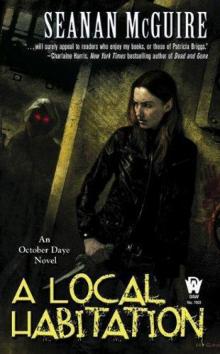 A Local Habitation
A Local Habitation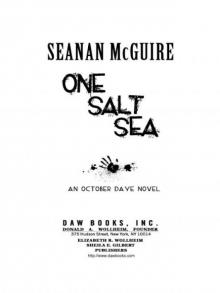 One Salt Sea
One Salt Sea Beneath the Sugar Sky
Beneath the Sugar Sky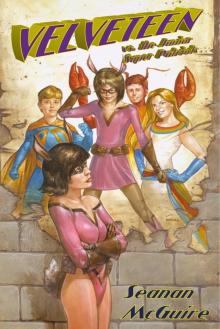 Velveteen vs. The Junior Super Patriots
Velveteen vs. The Junior Super Patriots The Girl in the Green Silk Gown
The Girl in the Green Silk Gown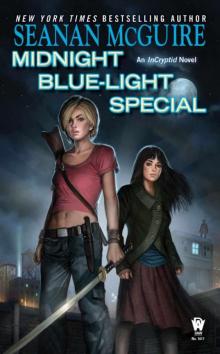 Midnight Blue-Light Special
Midnight Blue-Light Special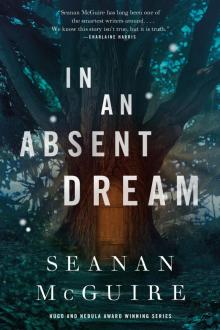 In an Absent Dream
In an Absent Dream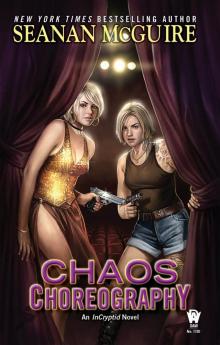 Chaos Choreography
Chaos Choreography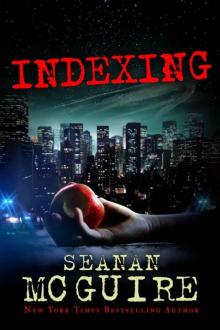 Indexing
Indexing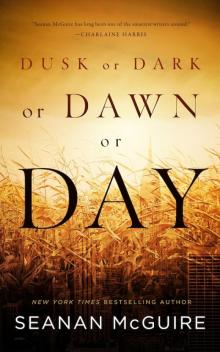 Dusk or Dark or Dawn or Day
Dusk or Dark or Dawn or Day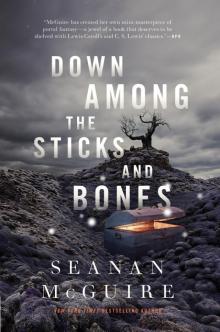 Down Among the Sticks and Bones
Down Among the Sticks and Bones The Razor's Edge
The Razor's Edge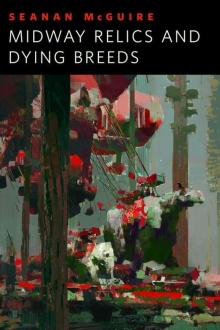 Midway Relics and Dying Breeds
Midway Relics and Dying Breeds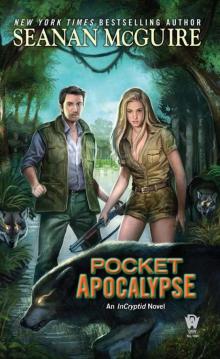 Pocket Apocalypse
Pocket Apocalypse The Brightest Fell
The Brightest Fell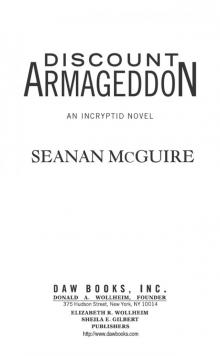 Discount Armageddon
Discount Armageddon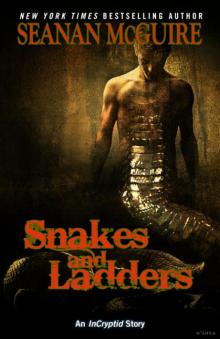 Snakes and Ladders
Snakes and Ladders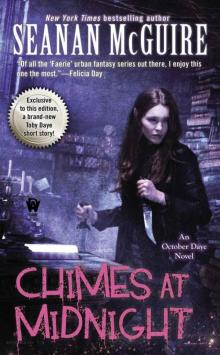 Chimes at Midnight
Chimes at Midnight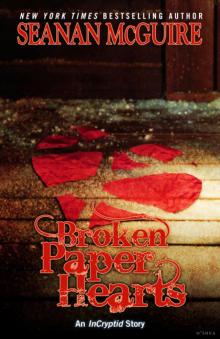 Broken Paper Hearts
Broken Paper Hearts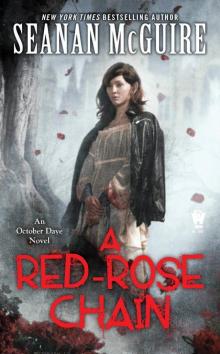 A Red-Rose Chain
A Red-Rose Chain Married in Green
Married in Green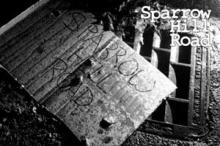 Sparrow Hill Road 2010 By Seanan
Sparrow Hill Road 2010 By Seanan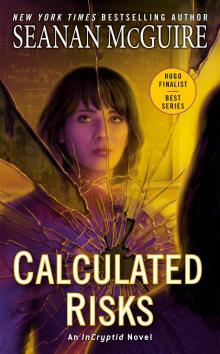 Calculated Risks
Calculated Risks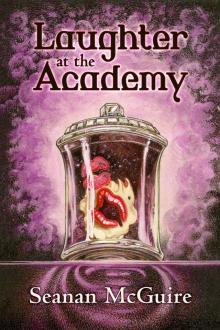 Laughter at the Academy
Laughter at the Academy The Winter Long
The Winter Long We Both Go Down Together
We Both Go Down Together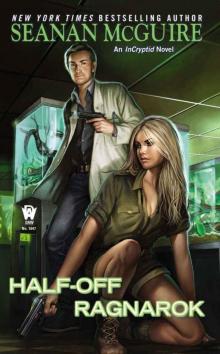 Half-Off Ragnarok
Half-Off Ragnarok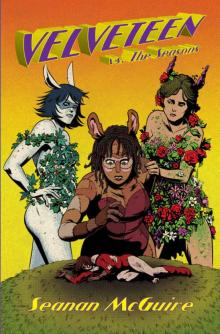 Velveteen vs. The Seasons
Velveteen vs. The Seasons Boneyard
Boneyard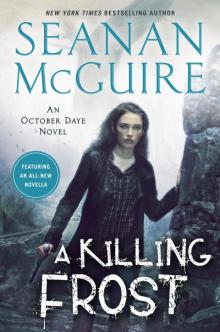 A Killing Frost
A Killing Frost Late Eclipses
Late Eclipses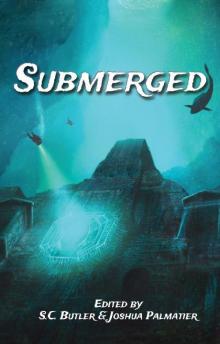 Submerged
Submerged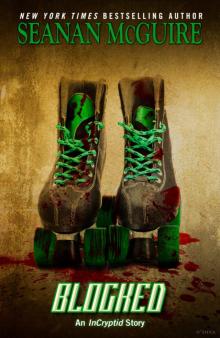 Blocked
Blocked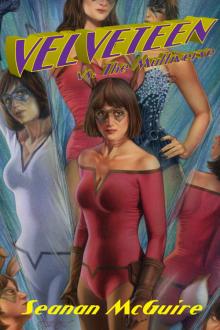 Velveteen vs. The Multiverse
Velveteen vs. The Multiverse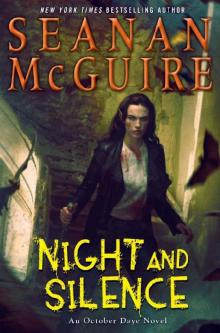 Night and Silence
Night and Silence The Unkindest Tide (October Daye)
The Unkindest Tide (October Daye)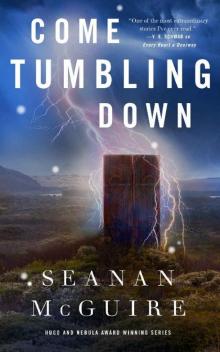 Come Tumbling Down (Wayward Children)
Come Tumbling Down (Wayward Children)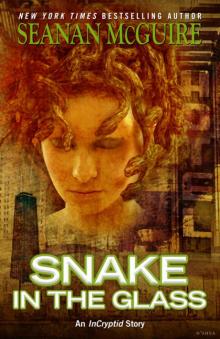 Snake in the Glass
Snake in the Glass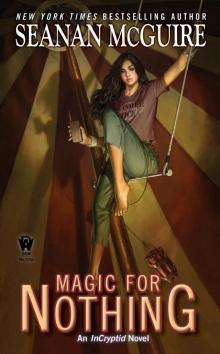 Magic for Nothing
Magic for Nothing Full of Briars
Full of Briars Oh Pretty Bird
Oh Pretty Bird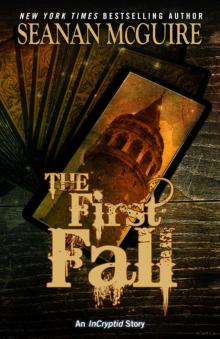 The First Fall
The First Fall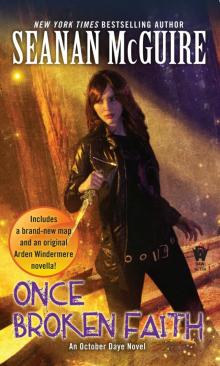 Once Broken Faith
Once Broken Faith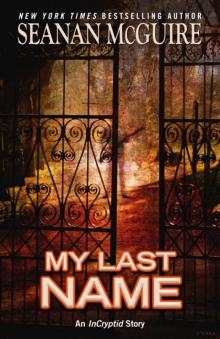 My Last Name
My Last Name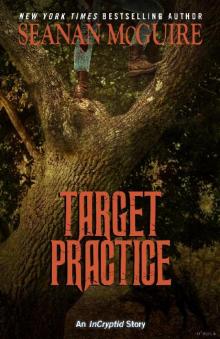 Target Practice
Target Practice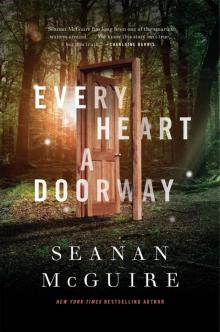 Wayward Children 01 - Every Heart a Doorway
Wayward Children 01 - Every Heart a Doorway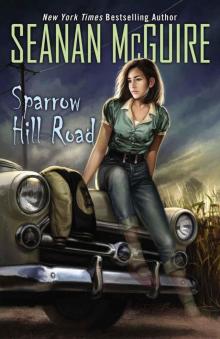 Sparrow Hill Road
Sparrow Hill Road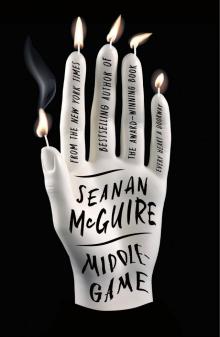 Middlegame
Middlegame Juice Like Wounds
Juice Like Wounds That Ain't Witchcraft
That Ain't Witchcraft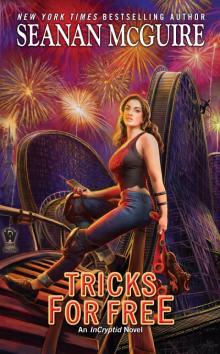 Tricks for Free
Tricks for Free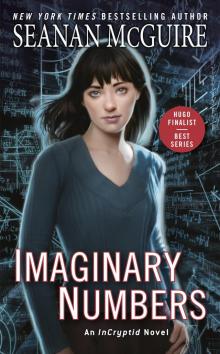 Imaginary Numbers
Imaginary Numbers The Star of New Mexico
The Star of New Mexico Lay of the Land
Lay of the Land One Hell of a Ride
One Hell of a Ride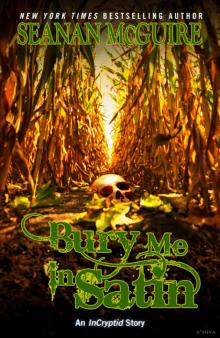 Bury Me in Satin
Bury Me in Satin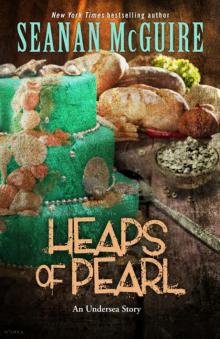 Heaps of Pearl
Heaps of Pearl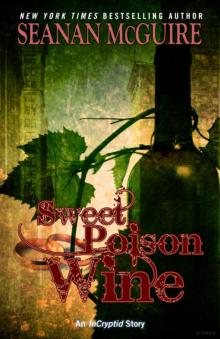 Sweet Poison Wine
Sweet Poison Wine When Sorrows Come
When Sorrows Come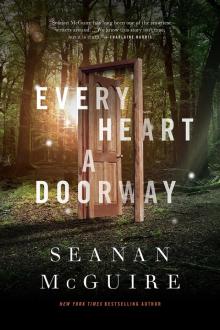 Every Heart a Doorway
Every Heart a Doorway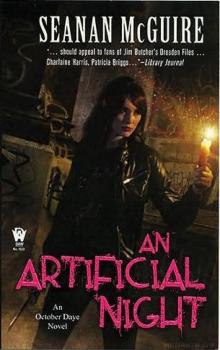 An Artificial Night - BK 3
An Artificial Night - BK 3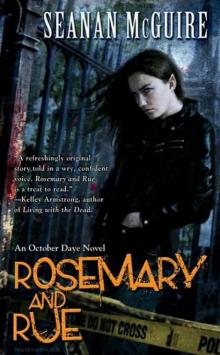 Rosemary and Rue
Rosemary and Rue Black as Blood
Black as Blood Loch and Key
Loch and Key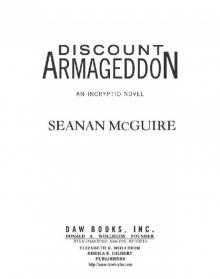 Discount Armageddon: An Incryptid Novel
Discount Armageddon: An Incryptid Novel The Unkindest Tide
The Unkindest Tide Ashes of Honor od-6
Ashes of Honor od-6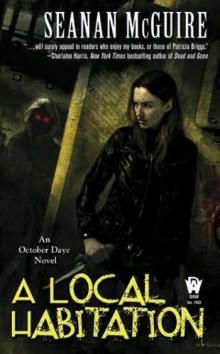 A Local Habitation od-2
A Local Habitation od-2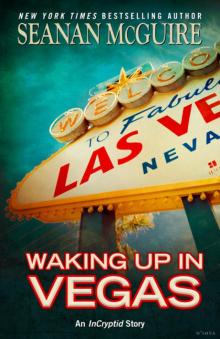 Waking Up in Vegas
Waking Up in Vegas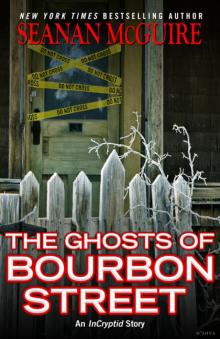 The Ghosts of Bourbon Street
The Ghosts of Bourbon Street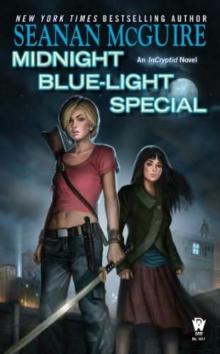 Midnight Blue-Light Special i-2
Midnight Blue-Light Special i-2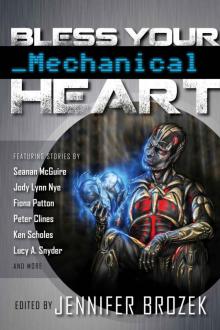 Bless Your Mechanical Heart
Bless Your Mechanical Heart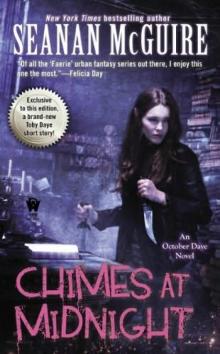 Chimes at Midnight od-7
Chimes at Midnight od-7 The Way Home
The Way Home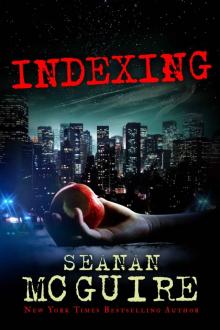 Indexing (Kindle Serial)
Indexing (Kindle Serial)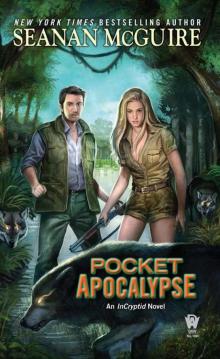 Pocket Apocalypse: InCryptid, Book Four
Pocket Apocalypse: InCryptid, Book Four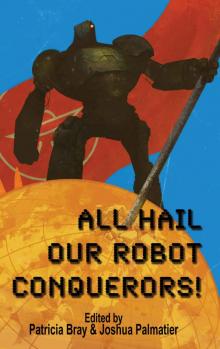 All Hail Our Robot Conquerors!
All Hail Our Robot Conquerors!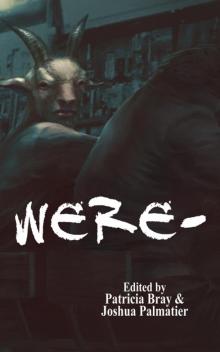 Were-
Were- That Ain't Witchcraft (InCryptid #8)
That Ain't Witchcraft (InCryptid #8)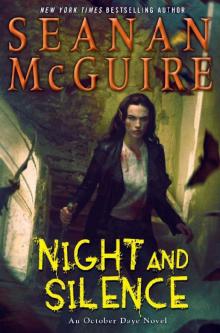 Night and Silence (October Daye)
Night and Silence (October Daye) Late Eclipses od-4
Late Eclipses od-4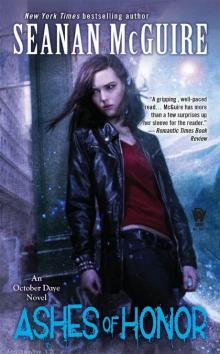 Ashes of Honor: An October Daye Novel
Ashes of Honor: An October Daye Novel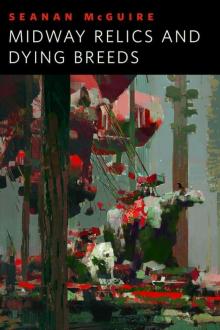 Midway Relics and Dying Breeds: A Tor.Com Original
Midway Relics and Dying Breeds: A Tor.Com Original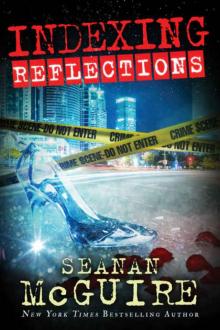 Indexing: Reflections (Kindle Serials) (Indexing Series Book 2)
Indexing: Reflections (Kindle Serials) (Indexing Series Book 2)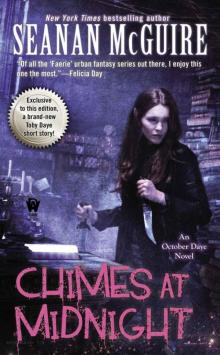 Chimes at Midnight: An October Daye Novel
Chimes at Midnight: An October Daye Novel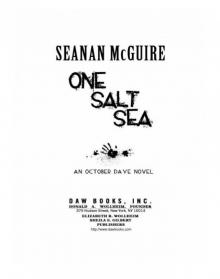 One Salt Sea: An October Daye Novel
One Salt Sea: An October Daye Novel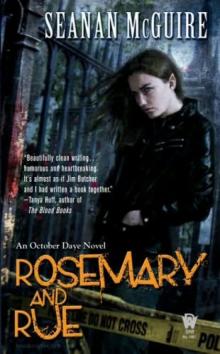 Rosemary and Rue od-1
Rosemary and Rue od-1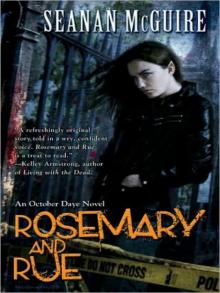 Rosemary and Rue: An October Daye Novel
Rosemary and Rue: An October Daye Novel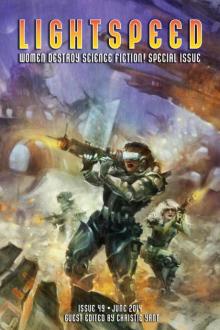 Lightspeed Magazine Issue 49
Lightspeed Magazine Issue 49 Alien Artifacts
Alien Artifacts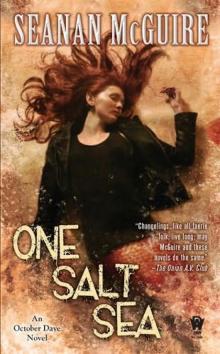 One Salt Sea od-5
One Salt Sea od-5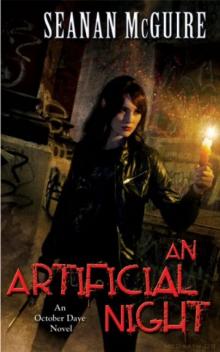 An Artificial Night od-3
An Artificial Night od-3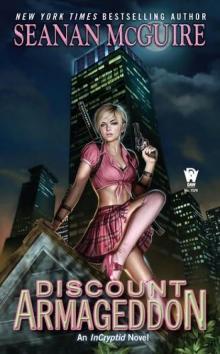 Discount Armageddon i-1
Discount Armageddon i-1